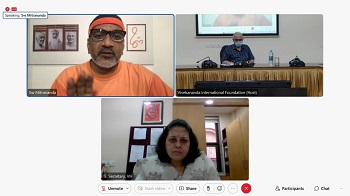The sixth session of the online talk series ‘Gītā for the Millennia’, based on Śrīmad Bhagavad Gītā by Svāmī Mitrananda of Chinmaya Mission was held on 1 July 2022. In this session, Svamji continued the discussion of the third chapter of the Gītā.
Svāmīji explained the verse that discusses how the collective actions of our world are only expressions of the collective desires of our population (Gītā 3.11 devān bhāvayatānena te devā bhāvayantu vaḥ parasparaṁ bhāvayantaḥ śhreyaḥ param avāpsyatha). A collective consciousness among people for the common well being would not only help societies to nurture each other but also to gratify our individual desire. Gītā 3.13 tells us that, without such a collective consciousness, if one person is taking away all the results, s/he is a ‘thief’ (stena eva saḥ). Metaphorically put, s/he, who eats alone, incurs sin (papa). Because that individual then is taking the lion’s share of the contribution of everybody. Even if such a ‘theft’ goes unpunished or unrecognised by the rule of law, it can't go off from the rule of karma.
Svāmīji highlighted that it is this culture of taking away all the results without sharing and cooperation that is responsible for our ecological crisis. Gītā states that by your sacrifices, the celestial gods will be pleased, and by cooperation between humans and the celestial gods, great prosperity will reign for all. All the ‘pagan’ traditions in one way or the other had a reverential attitude towards nature and nurtured the natural forces in the form of different deities. Once we lost these traditions, we subsequently lost the reverential attitude towards them as well. As a result, we have exploited every Devas in all possible ways and are expecting nature to be kind to us. On the other hand, our attitude today is that everything is created for the utility of humans. This attitude of humano centrism and separation between creation and created has its theological roots in Abrahamic faiths.
The importance of living in a harmonious way is also important because each of us is model to others in various ways; knowingly or unknowingly we influence others, through our actions. Therefore, our life itself is to be understood as a performance of Dharma. This way we all can set examples for others to function (Gītā 3.21). And for that, one must dedicate our actions to God, to perform our duty without desire, selfishness and our mental grief to depart. (Gītā 3.30).








Post new comment